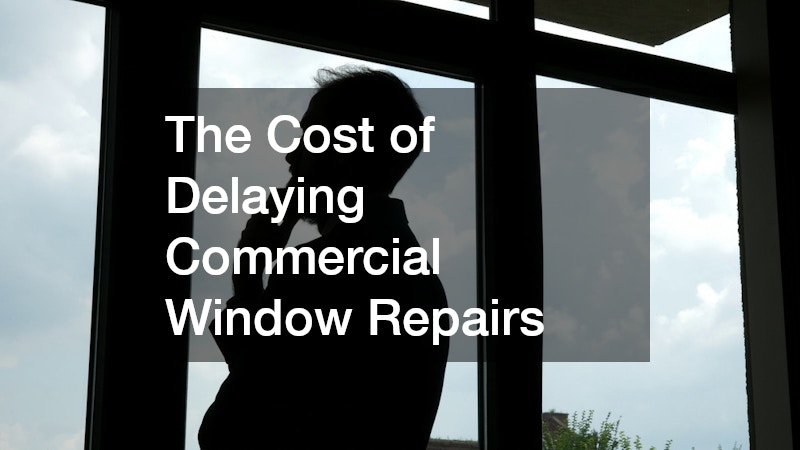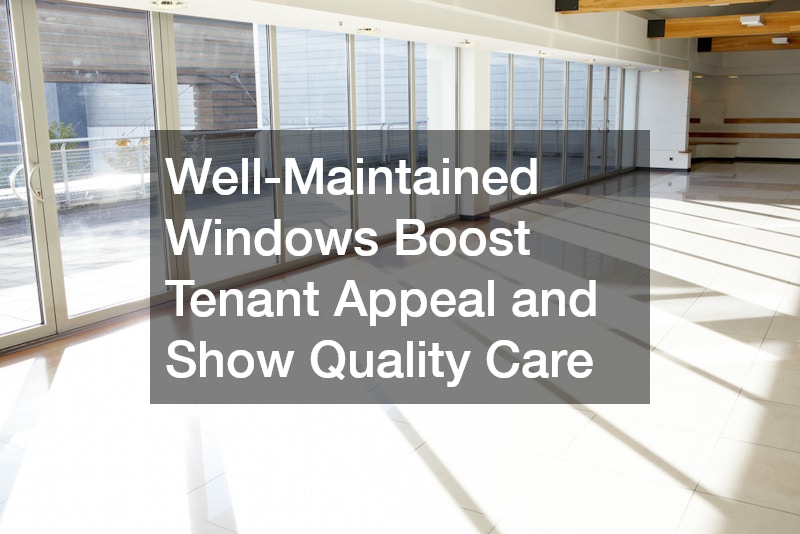In the world of commercial property management, windows play a crucial role in aesthetics, energy efficiency, and tenant satisfaction. These architectural elements are more than just functional—they contribute to the visual appeal of a building, help regulate internal climate, and influence tenant perceptions. Despite their importance, window maintenance often takes a backseat to other property priorities. However, the costs of delaying commercial window repairs can be far-reaching and detrimental.
This article explores the significant consequences, both immediate and long-term, of postponing necessary window repairs. From increased energy bills and compromised security to lower tenant retention and property devaluation, the financial and operational impacts are real.
Understanding these risks can help property managers make informed decisions that protect the building’s integrity and support long-term profitability.
What are the immediate impacts of ignoring commercial window repairs?
Increased Energy Costs
When commercial windows are in disrepair, they can significantly compromise the building’s insulation. Inadequate insulation due to damaged windows leads to increased reliance on heating and cooling systems, thus escalating energy bills.
In fact, energy inefficiency due to poor window maintenance can account for up to 30% of a building’s energy loss. This not only impacts the financial bottom line but also increases the carbon footprint of the property.
Business owners looking to cut costs will find that prompt window repairs can provide substantial energy savings. Furthermore, making the necessary repairs contributes to a more sustainable building practice.
Security Vulnerabilities
Damaged commercial windows can present significant security risks, potentially allowing unauthorized access. Broken locks or cracked glass may present opportunities for intruders to exploit these vulnerabilities.
Property managers need to understand that the cost of a break-in or vandalism far outweighs the cost of window repairs. In addition to theft, property damage during unauthorized entry can result in substantial financial loss.
Failing to repair windows weakens the perceived security of the building, detrimentally affecting the reputation of the premises. Prioritizing timely window repair can enhance overall building security, reassuring both tenants and owners.
How do delays in window repairs affect tenant satisfaction and occupancy rates?
Decreased Tenant Comfort
Faulty windows often lead to drafts that make indoor environments uncomfortable for tenants. This discomfort is compounded by external noise pollution that damaged windows fail to filter out.
Tenants expect a certain level of comfort in a commercial setting, and disruptions due to window issues can sour their overall experience. When comfort is compromised, tenants may raise complaints, affecting their relationship with property management.
To maintain a high standard of tenant satisfaction, property managers need to ensure that windows are in optimal condition. Immediate repairs contribute to creating a conducive work or business environment.
Potential Increase in Vacancy Rates
Unsatisfied tenants often contemplate relocating, which can lead to higher tenant turnover. An increase in vacancy rates reduces consistent income flow, posing a financial challenge to property owners.
A key factor in tenant retention is their satisfaction with the property’s amenities, including the condition of the windows. Poor maintenance can serve as a deal-breaker, influencing tenants’ decisions to vacate the premises.
By addressing window repairs promptly, property managers can maintain occupancy rates and avoid the costs associated with finding new tenants. Continued occupancy ensures a stable investment return for property owners.
What are the long-term financial implications of postponing commercial window maintenance?
Escalating Repair Costs
Minor window issues, if left unattended, can develop into major structural challenges that demand costly repairs. The longer repairs are postponed, the more likely it becomes that the entire window system may require replacement.
For property managers, this delayed response translates to higher repair costs in the future. Being proactive with window maintenance can save significant amounts in repair costs down the line.
Property management must adopt a preventative maintenance mindset to mitigate these escalating costs. Investing in routine checks and repairs ensures minor issues are dealt with before they become major problems.
Devaluation of Property
Poorly maintained properties, particularly with visible window damage, are likely to suffer from reduced market value. Potential buyers or investors may perceive such properties as needing extensive repairs, which affects their willingness to pay top dollar.
This devaluation impacts the owner’s return on investment, as properties are less attractive in the competitive real estate market. Maintaining the integrity and appearance of windows is critical to preserving property value.
By ensuring that windows are in good condition, property owners can safeguard their investment and maximize the property’s market appeal. Prioritizing repair work today acts as a protective measure against devaluation in the future.

